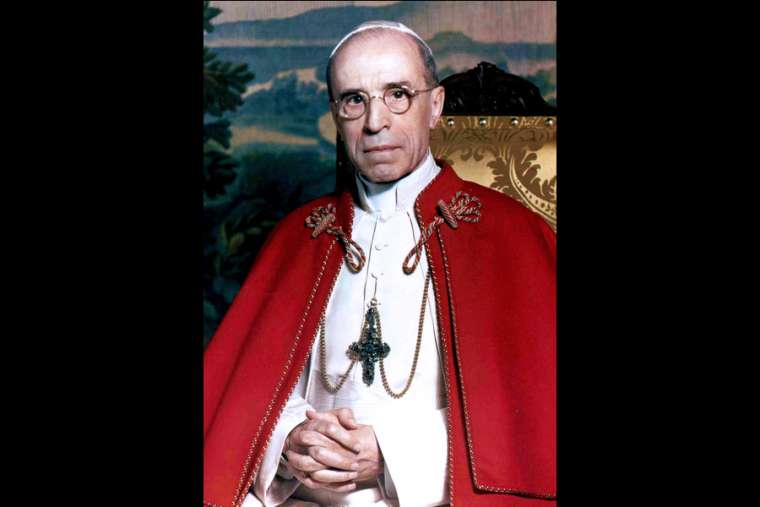Scholars say charges that Pope Pius XII covered-up the Vatican’s knowledge of the Holocaust are based on exaggerated claims and do not represent the truth.
Fr. Hubert Wolf, a professor of history at the University of Munster, claimed last month that in the Vatican’s recently opened archives on Pope Pius XII, he had found an anti-Semitic memo which suggested that Pope Pius XII knew about the Holocaust in Europe before the U.S. government did, but made efforts to conceal his knowledge.
But Ronald Rychlak, a professor at the University of Mississippi’s law school and the author of “Hitler, the War, and the Pope” told CNA that Wolf’s argument doesn’t stand up to historical scrutiny.
What Pope Pius XII knew and did during World War II has been a source of controversy for years. That controversy was reignited in early March when the Vatican opened to researchers its archives on Pius XII. Wolf was among the researchers. But a week after the archives were opened, the coronavirus lockdown in Italy forced researchers to pause their work.
Undeterred, Wolf told German and American media this month that he had found a key document which, he said, could prove that Pius XII lied to the U.S. government by claiming in 1942 that he could not verify intelligence reports, which came from the Jewish Agency for Palestine in Geneva, about death camps for the mass murder of Jews in Poland and Ukraine.
When the U.S. entered World War II in 1942, it did not yet have knowledge of the scale of atrocities committed against Jewish people across Europe, especially the mass murder of Jews in Eastern Europe. It had received reports of those atrocities, however, and was making efforts to verify them.
In 1942, the Vatican, too, had received reports, mostly from Church leaders, about the mass murder of Jews by Nazi forces.
Nevertheless, in September 1942, when a U.S. official asked the Vatican to verify a report from the Jewish Agency for Palestine, Vatican officials said they could not independently confirm the information it contained regarding the existence of death camps, but that the Vatican did know, and had received reports, about atrocities committed by Nazi forces, adding that “the Holy See is taking advantage of every opportunity offered in order to mitigate the suffering.”
Rychlak told CNA that the Holy See’s concern to be judicious about verifying any report “can logically be traced to WWI, when false stories of atrocities were often circulated,”
But after examining the Pius XII archives for a week in March, Wolf pointed journalists this month to a 1942 memo from a staffer in the Vatican’s Secretary of State, Msgr. Angelo Dell’Acqua, who later became a cardinal. The memo, which has not been released to the public, apparently cautioned against verifying the report from the Jewish Agency for Palestine.
Wolf told journalists that the memo warned against believing the report because Jews “easily exaggerate.”
“This is a key document that has been kept hidden from us because it is clearly anti-Semitic and provides background information on why Pius XII did not speak out against the Holocaust,” Wolf told a Munster Catholic newspaper.
German journalist Michael Hesemann was also among the researchers who examined Pius XII’s archives in March. In a statement sent to CNA, he said that Wolf has made his claim about Pius XII without understanding the meaning of the memo he found, or its significance.
He added that the memo “warns not to draw premature conclusions on the new information, [stating]: ‘It is necessary to assure that they are true, since exaggerations happen easily, also among Jews.’ With other words: Trust but verify!”
“For Wolf, this is evidence for the Vatican’s anti-Semitism during the pontificate of Pius XII. For him, it means, and this is how he paraphrases it in several interviews with German media: ‘All Jews are liars,” Hesemann said.
“But it means nothing like that, Hesemann said, explaining that the memo was intended to urge caution against any exaggeration.
“And indeed the Jewish Agency’s report contained several rumours which were not true at all, as we know today. It claimed that ‘in all Eastern Poland and the occupied Russian territories, not a single Jew is alive anymore.’ We know that thousands survived in the underground or became partisans.”
“No government in the world would act on a single report, but waits for an independent verification – that’s why President Roosevelt asked the Vatican, in the first place,” Hesemann added.
In either case, Hesemann said, the memo “did not influence papal policy, which remained the same before and after, nor does it contain any new information. It is one man’s reminder to trust and to verify and nothing more.”
The memo is not included in an 11-volume cache of Vatican documents from the Second World War. To Wolf, this is a reason to be skeptical about the volumes, according to the Washington Post.
But to Hesemann, the memo was not included “not because of a Vatican cover-up, but because it’s irrelevant.”
Hesemann cautioned that Wolf, who has “promoted conspiracy theories” about Pius XII in the past “draws premature conclusions, blames the Vatican of a cover-up and creates sensationalist headlines,” to further “his own agenda,” namely, “stop the ongoing beatification process of Pius XII – at least until he and his team have evaluated the last of the pages Pope Francis made available for historical research.”
Rylchak pointed out evidence, presented in his book, of Pius XII’s concern to oppose the Nazis, which he says was well-recognized by journalists and bishops during the Second World War. He also pointed out that Pius XII, through “ a long series of communications with the American bishops,” encouraged opposition to Nazi ideology.
“Despite all of this, Wolf would have us believe that Pius did not make his opinion known due to a cover note from a low-level assistant,” Rylchak said, calling the assertion “ridiculous.”

